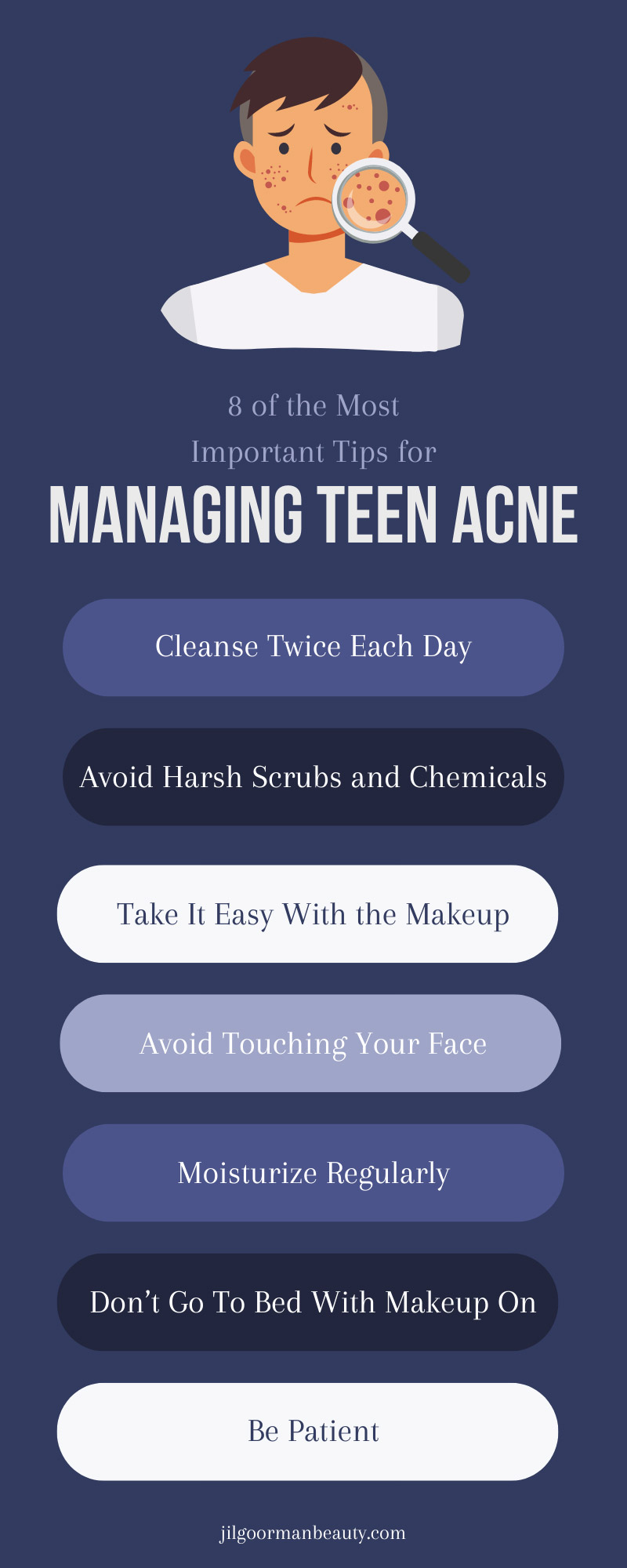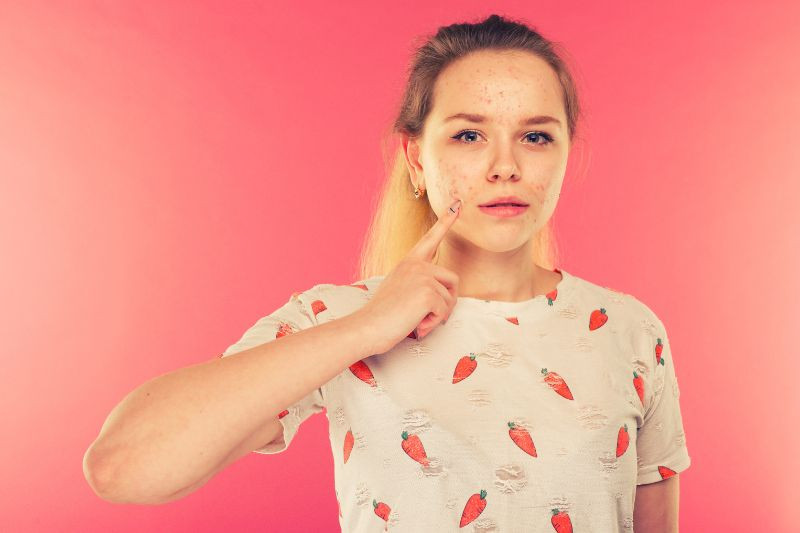Almost all teens develop acne at some point, and it’s important to remember that you’re not alone. Although acne isn’t a serious health risk, it can leave scars and wreak havoc on your confidence. It might feel like the end of the world, but you can rely on eight of the most important tips for managing teen acne to get you through this challenging season.
Cleanse Twice Each Day
Although it’s tempting to wash your face constantly, it can cause dryness and irritation by stripping your skin of its natural oils. The best way to ward off breakouts and blemishes is by washing your face twice each day. Gently lather a cleanser onto your skin, and use warm water to rinse. Depending on your needs and skin sensitivity, you should choose a cleanser with the formula that is right for you.
Gentle Formulas
Gentle formulas are the best option for those with ultra-sensitive, dry skin. These cleansers typically don’t contain any active ingredients, and they work to unclog pores and cleanse your skin gently.
Salicylic Acid
While putting acid on your skin may sound harsh, salicylic acid is gentle enough to act as an excellent topical acne treatment. In fact, it harbors anti-inflammatory properties, which soothe blemishes and acne irritation with ease. However, cleansers containing salicylic acid can cause dryness and itchiness for those with ultra-sensitive skin.
Avoid Harsh Scrubs and Chemicals
You might have the urge to use scrubs and other chemicals to rid your skin of acne, but using a gentle cleanser on your skin is the best option. Although using astringent and rubbing alcohol shortens a pimple’s life by drying it out, it can also damage your skin’s protective barrier.
Using exfoliating scrubs may sound like a good idea, but using them too often can cause additional irritation rather than heal your skin. The burning, tingling, or itching sensation that often comes with harsh products doesn’t mean it’s working—it’s actually damaging your skin. Instead of stripping your skin of much-needed moisture, opt for a gentle skincare kit for acne-prone skin to heal and restore clarity.
Act Fast on a Breakout
When you act fast at the first sign of a breakout, you can reduce the chances of acne scarring or a widespread breakout. Whether you use a spot treatment or become more diligent about keeping your face clean, catching acne in its beginning phases is the best way to stop it in its tracks.
Take It Easy With the Makeup
Covering blemishes with makeup is a go-to solution for many people with acne-prone skin; however, this does more harm than good. Most cosmetics inevitably clog pores and make acne worse. Although covering any blemishes may temporarily restore your confidence and self-esteem, it can ultimately extend your acne’s life.
It’s no secret that healing skin needs time to breathe, but layering on the makeup each day suffocates your skin for several hours. Minimizing or eliminating foundation and concealer from your routine is the best option, but you should choose a non-acnegenic formula if you must wear makeup.
Avoid Touching Your Face
Your parents or grandparents have probably told you to keep your hands away from your face, and it’s for your own good. One of the leading causes of acne is bacteria, and you spread germs and bacteria from your hands when you touch your face.
Not only can these germs cause breakouts, but they can also make you sick. Aside from spreading bacteria, touching your face can also have other consequences.
Popping Pimples
Even though you might think popping your pimples is the best solution for clearing acne, it can cause more damage than healing. For instance, popping and picking cause additional redness and irritation, and spread germs to other areas of your face.
Aside from extra trouble in the moment, popping your pimples and picking at scabs is a surefire way to increase your chance of acne scars that can last a lifetime. Instead, give your face a break and let your skin heal itself.
Additional Oils
If you struggle with blemishes and breakouts on your jawline, there’s a good chance it’s a result of touching your face too often. Beyond the germs and bacteria you spread to your face, you also transfer additional oils from your hands when you touch your face.
Moisturize Regularly
Even if you feel oily enough already, that’s no excuse to skip moisturizer. Those with oily skin are more likely to have breakouts, but your body produces additional sebum (oil) when your skin isn’t receiving enough moisture. As a result, moisturizing more frequently may actually reduce your excess oil production. It’s important to note that not all products are suitable for all skin types, so you must choose one that works for your unique skin needs.
Gel Products
Gel-based products are typically the best option for those with oily skin. They provide adequate moisture, but they’re light enough to let your skin breathe.
Cream Products
On the other hand, cream-based products are a good option for those with dry skin. They’re heavier and easily combat dry and flaky skin. In addition, cream moisturizers work as a skin protectant.
Don’t Go To Bed With Makeup On
One of the best pieces of advice when it comes to acne is to remove your makeup before bed each night. Your body uses the time you’re asleep to recover and heal your skin, but it can’t do so if you still have makeup layered on your face. Your acne will most likely worsen, and your skin will suffer rather than heal.
Pro Tip: Remove your makeup and do your skincare routine as soon as you get home from school to avoid the urge to skip it before bed.
Be Patient
Last but certainly not least, be patient. Clear, beautiful skin doesn’t happen overnight, and you can’t expect immediate results even if you’re taking care of your face properly. Acne can take a few weeks to clear up completely, but that doesn’t mean you shouldn’t do everything you can to manage your breakouts.
With eight of the most important tips for managing teen acne, you’re on the path toward clear, vibrant skin. You’re never alone in your battle with acne, and you should never feel shame. Although your blemishes might briefly take a toll on your confidence, never forget that you’re more than the quality of your skin.


